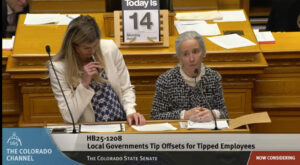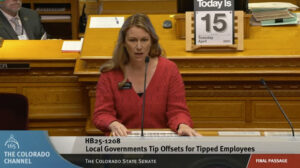Colorado restaurants’ two-part strategy to reduce cost pressures during a period of significant eatery closings fully collapsed this week after a Senate committee killed a bill Monday to bar credit-card processors from charging fees on taxes and tips.
The death of House Bill 1282 came a month-and-a-half after a House committee gutted a separate bill, HB 1208, that would have reset hourly minimum wages for tipped workers in cities and counties that have raised their minimum base pay above statewide floor levels. While the two pieces of legislations had different issues and critics, labor unions were a common opponent of both efforts.
Eateries are closing at troubling numbers — Denver staffers said the number of restaurants operating in the city fell 22% last year — as they struggle with rising labor and supply costs and changing habits of diners who are unwilling to stomach commensurate price hikes. The two bills, backed by the Colorado Restaurant Association, were efforts to lower two of the most troubling costs that eatery owners face.
By barring credit-card processors from charging the typically 2% to 4% swipe fees on tips and taxes, HB 1282 would have saved at least $50,000 each year for about 75% of restaurants, according to CRA research. That’s enough not just to help restaurants that are losing money now but to allow them to hire new workers, industry leaders said.
How the two bills could have helped restaurants
HB 1208 sought to address the rising cost of labor by creating a single statewide minimum wage for tipped workers of $11.79, which reflects the $3.02 gap enshrined in state law between tipped workers and non-tipped workers who have a minimum wage of $14.81. Denver has boosted its minimum wage — and hence, its tipped minimum wage — by $4 over state levels, and restaurateurs in that city say they’ve had to cut other jobs, reduce supply costs and defer maintenance to raise the base wages of wait staff and bartenders who commonly earn more even than managers because of tips.
But unions and labor advocates led a campaign against HB 1208 — involving relentless calls to restaurants and the posting of one-star reviews on sites against restaurant owners who supported the bill — that was so vicious as to bring a rebuke from House leaders. And under that pressure, cosponsoring Democratic Reps. Steven Woodrow and Alex Valdez of Denver amended the bill to allow local governments with higher minimum-wage rates to expand the tip credit beyond $3.02 but does not require such a move.

Colorado state Sens. Lindsey Daugherty and Judy Amabile speak about House Bill 1208 in the Senate.
Meanwhile, banks and credit unions argued that HB 1282 was a lawsuit waiting to happen, as it violated federal rules that state governments can’t infringe on the rights of federally regulated banks, which involve setting fees and engaging in credit-card offerings. Unions joined in the dissent, arguing that leaders of the national movement to limit swipe fees, such as Target and Walmart, are “anti-union mega corporations” whose actions will cause credit-card processors to stop offering rewards programs funded by swipe fees.
Stunning turnarounds on votes
The arguments from banks and credit unions left even ideological supporters of the idea of cutting costs to small businesses, such as Democratic Sen. Mike Weissman of Aurora, saying they couldn’t back it because of all the legal questions surrounding the bill. As a result, cosponsoring Sen. Lindsey Daugherty, D-Arvada, asked the Senate Finance Committee to kill HB 1282, even as she said the practice of charging fees on taxes and tips “isn’t just fundamentally unfair; it’s predatory.”
On Tuesday morning, Colorado Restaurant Association President/CEO Sonia Riggs lamented the legislative turnabout on bills that had passed their first committees by margins of 11-2 (HB 1208) and 9-3 (HB 1282) due to overwhelming opposition campaigns. She called HB 1208, which is on its way to Gov. Jared Polis’ desk, a “small victory” because of its allowance for local governments to expand tip credits if they can withstand intense opposition campaigns but said struggling businesses won’t get legislative help this year.
“Without immediate relief, local independent restaurants face an even tougher road ahead — dealing with rising costs, growing wage disparities and predatory swipe fees,” Riggs said in a statement to The Sum & Substance. “Many operators will be forced to cut staff, raise prices or close altogether.”

Sonia Riggs is president and CEO of the Colorado Restaurant Association
Opponents of the bills offered decidedly different analyses of their outcomes, however.
Colorado companies at “competitive disadvantage”?
HB 1282 would have required multiple levels of processing to determine which portions of costs were due to taxes and tips, and many credit cards don’t offer those, warned Lavonne Heaviland, president of FirstBank. That could have caused Colorado-issued credit cards to not work with processing machines elsewhere that don’t require three levels of processing, and it might have meant that out-of-state cards don’t work in Colorado, she said.
And if credit-card processors nixed rewards programs because of a loss of revenue from the tax and tip swipe fees, part of more than $2 billion in swipe fees generated annually in Colorado, that would have hurt the state’s tourism business, local leaders said. Chris Romer, president/CEO of the Vail Valley Partnership, said that Colorado ranks in the top four states for rewards-points redemption and that 768,000 passengers use such points to travel here annually, meaning Colorado could lose visitors under HB 1282.
“HB 1282 … could have placed Colorado-based credit unions at a greater competitive disadvantage compared to national banks, potentially limiting our ability to serve our members and our communities,” said Ben Metzger, Canvas Credit Union vice president of strategy, who testified that federal pre-emptions may have meant that only local financial institutions would be subject to the bill’s limits. “We fully support efforts to strengthen small businesses in Colorado and appreciate the passion and hard work behind this legislation. As we move forward, we look forward to collaborating with all stakeholders to explore creative solutions that address these important issues while supporting the needs of all Coloradans.”
More things wrong with restaurants, opponents say

Colorado state Sen. Jessie Danielson speaks in the Senate against a bill to allow some local governments to expand tip credits.
Meanwhile, despite the massive changes its Democratic sponsors made to HB 1208, the bill still passed the Senate only by 21-13, with all 13 “no” votes coming from Democrats and making up a majority of that caucus. Sen. Julie Gonzales, D-Denver, said the bill also should have allowed local governments to close or eliminate the tip credit if they chose, and Sen. Jessie Danielson, D-Wheat Ridge, blamed “corporate interests” for bringing the bill forward despite all restaurant testimony being from local companies.
“The cause of all the difficulties does not rest in the fact that servers earn too much money,” Danielson said. “There are a lot more things going wrong with the industry.”
The 2025 legislative session ends on May 7, leaving Polis until June 6 to choose to sign or veto HB 1208.
